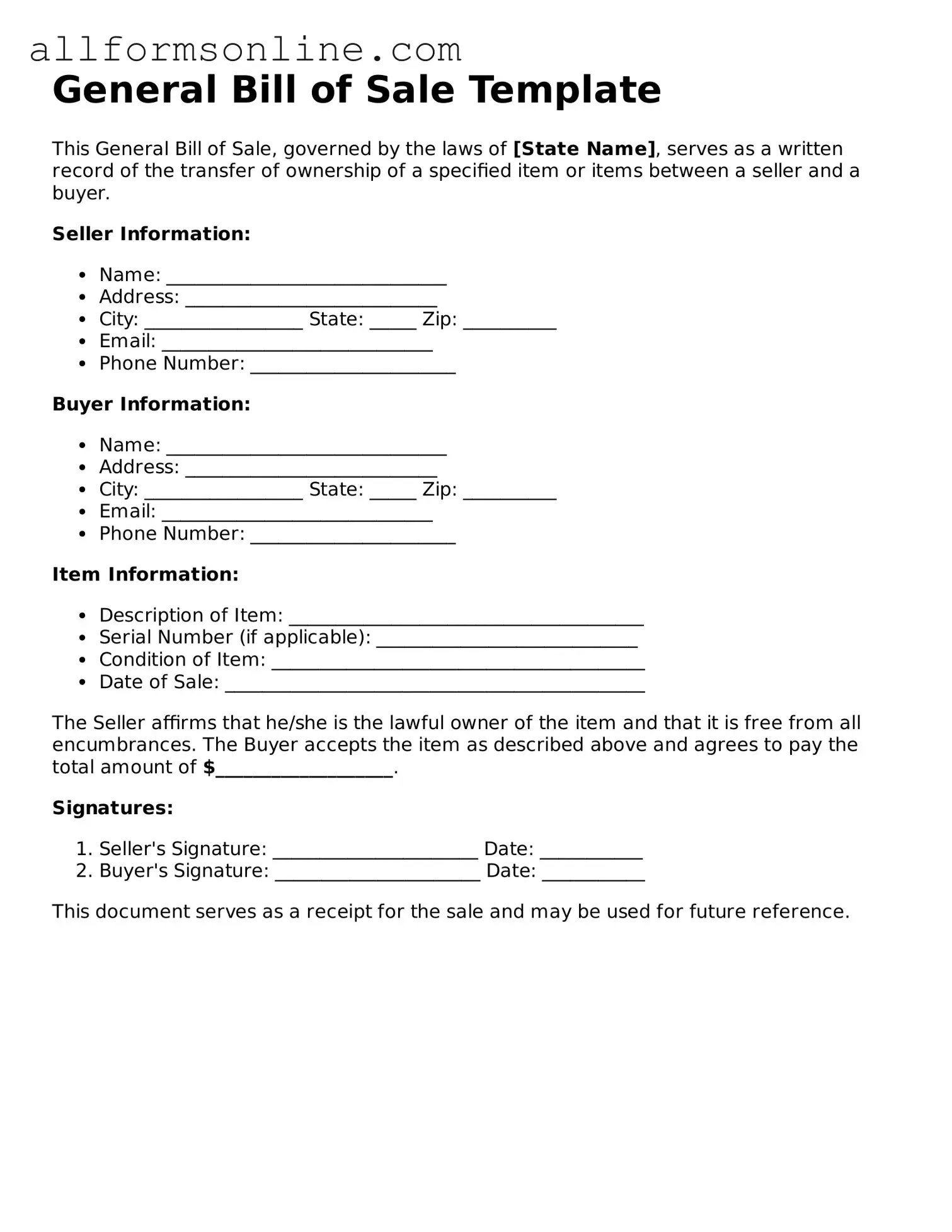Blank General Bill of Sale Form
Misconceptions
Understanding the General Bill of Sale form is crucial for anyone involved in buying or selling personal property. However, several misconceptions can lead to confusion or legal issues. Here are five common misunderstandings:
- It’s only necessary for large transactions. Many people believe that a Bill of Sale is only required for high-value items. In reality, it can be beneficial for any transaction, regardless of the amount. It provides a record of the sale and protects both the buyer and seller.
- It’s not legally binding. Some individuals think that a Bill of Sale is merely a formality. However, when properly completed and signed, it serves as a legally binding document. It can be used in court to prove ownership and terms of the sale.
- It’s the same as a receipt. While both documents serve as proof of a transaction, they are not the same. A receipt typically confirms payment, whereas a Bill of Sale details the transfer of ownership and includes specific terms of the sale.
- Only professional sellers need one. Many assume that only businesses or professional sellers require a Bill of Sale. This is not true. Individuals selling personal items can also benefit from having a formal record of the transaction.
- It doesn’t need to be notarized. Some people think that a Bill of Sale does not require notarization to be valid. While notarization is not always necessary, having it notarized can add an extra layer of protection and authenticity to the document.
By dispelling these misconceptions, individuals can better understand the importance of the General Bill of Sale form and ensure their transactions are secure and legally sound.
What to Know About This Form
What is a General Bill of Sale?
A General Bill of Sale is a legal document that records the transfer of ownership of personal property from one party to another. It serves as proof of the transaction and includes essential details such as the names of the buyer and seller, a description of the item being sold, and the sale price.
What types of items can be sold using a General Bill of Sale?
This form can be used for various types of personal property, including vehicles, equipment, furniture, and other tangible items. However, it is not suitable for real estate transactions, which require different documentation.
Is a General Bill of Sale required by law?
While a General Bill of Sale is not legally required for all transactions, having one is highly recommended. It provides a clear record of the sale, which can help prevent disputes and protect both parties' interests.
Do I need to have the General Bill of Sale notarized?
Notarization is not typically required for a General Bill of Sale. However, some states may have specific requirements, especially for certain types of property, like vehicles. It is advisable to check local regulations to ensure compliance.
What information should be included in a General Bill of Sale?
Essential information includes the names and addresses of both the buyer and seller, a detailed description of the item being sold (including serial numbers, if applicable), the sale price, and the date of the transaction. Both parties should sign the document to validate it.
Can a General Bill of Sale be used for a vehicle sale?
Yes, a General Bill of Sale is commonly used for vehicle sales. It helps document the transfer of ownership and can be necessary for vehicle registration and title transfer in many states.
What happens if there are issues after the sale?
If disputes arise after the sale, the General Bill of Sale can serve as evidence in resolving the matter. It outlines the terms of the sale and can clarify what was agreed upon by both parties.
Can I create my own General Bill of Sale?
Yes, you can create your own General Bill of Sale. Many templates are available online, or you can draft one from scratch. Ensure that it includes all necessary information to make it legally binding and effective.
Where can I obtain a General Bill of Sale form?
General Bill of Sale forms can be found online through various legal document websites, or they may be available at local office supply stores. Additionally, some state government websites provide free templates that comply with local laws.
Popular General Bill of Sale Types:
Rv Bill of Sale Example - It is advisable to complete the Bill of Sale before the RV changes hands.
For a smooth transaction, it is crucial to utilize a well-prepared comprehensive Motor Vehicle Bill of Sale that clearly defines all the necessary details of the sale, safeguarding both the buyer and the seller.
Faa Aircraft Bill of Sale - By using this form, both seller and buyer acknowledge their agreement to the sale.
Bill of Sale for Jet Ski and Trailer - Completing this document can signify the start of new adventures on the water.
How to Use General Bill of Sale
After gathering the necessary information, you are ready to fill out the General Bill of Sale form. This document serves as a record of the transaction between the buyer and seller. It is important to ensure all details are accurate to avoid any disputes in the future.
- Title of the Form: At the top of the form, write "General Bill of Sale."
- Seller Information: Fill in the seller's full name, address, and contact information.
- Buyer Information: Enter the buyer's full name, address, and contact information.
- Date of Sale: Write the date when the transaction is taking place.
- Description of the Item: Provide a detailed description of the item being sold, including make, model, year, and any identifying numbers (like VIN for vehicles).
- Sale Price: Clearly state the total amount for the sale.
- Payment Method: Indicate how the payment will be made (cash, check, etc.).
- Signatures: Both the seller and buyer must sign and date the form to validate the transaction.
